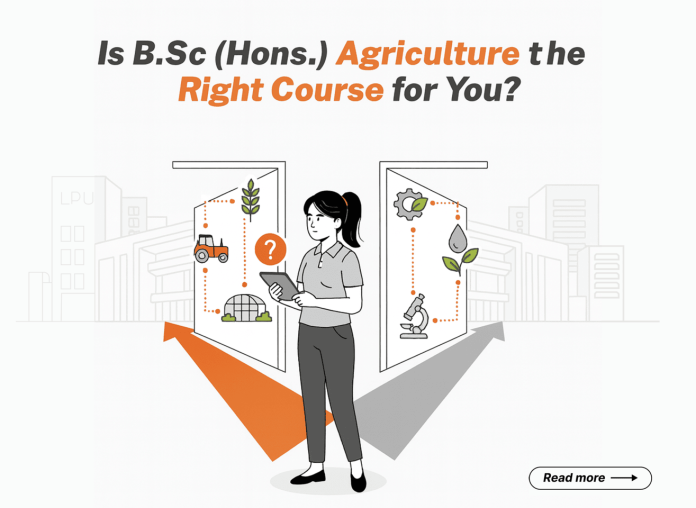- Why Choosing the Right Course Matters?
- What Is B.Sc. Hons. Agriculture?
- Who Should Consider B.Sc. Hons. Agriculture?
- What Do You Study in B.Sc. Hons. Agriculture?
- Why Agriculture Is a Game-Changer in Food, Farming & Allied Sectors?
- B.Sc. Hons. Agriculture Scope in Future: What’s Next?
- Alumni Success Stories in Agriculture
- How to Maximize Your Career After B.Sc. Hons. Agriculture?
- Conclusion
- FAQs
Why Choosing the Right Course Matters?
Choosing the right course after Class 12th is one of the most crucial life decisions, as it not only shapes your career trajectory but also impacts your overall personal growth and development. In today’s world, where competition is high and opportunities are vast, making an informed choice about your education is more important than ever. While many students still gravitate toward traditional fields like engineering, medicine, or commerce, there is a growing awareness about the importance of agriculture as a career option.
A career in agriculture is emerging as a dynamic, impactful, and rewarding alternative, especially for students who have a passion for innovation, technology-driven solutions, and food security. Your decision should always align with your personal interests, long-term goals, and values. Ask yourself: Do you feel a natural connection to the environment and farming? Are you fascinated by how modern technology can transform the way we grow food? Do you want to play a role in solving pressing global issues like hunger and food scarcity? If your answer is yes to any of these, then pursuing an undergraduate agriculture programme might just be the right path for you.
Opting for a B.Sc. Hons. Agriculture degree means you are not just choosing a course—you are making a commitment to contribute to one of the world’s most essential sectors: food production and sustainable resource management. This degree offers a perfect blend of theoretical knowledge and hands-on practical training, ensuring that graduates are well-prepared for the diverse opportunities in the agri-food value chain. From working in research and development to agribusiness, technology integration, government roles, and entrepreneurship, this programme equips you with the skills required to thrive in a constantly evolving global industry.
In essence, pursuing B.Sc. Hons. Agriculture is not just about studying farming techniques; it’s about becoming part of a future-ready workforce that is dedicated to ensuring food security, promoting sustainable agriculture, and driving innovation in one of the most critical industries worldwide.
What Is B.Sc. Hons. Agriculture?
B.Sc. Hons. Agriculture is a four-year undergraduate degree programme that provides a comprehensive understanding of agricultural science and its practical applications. This bachelor of agriculture degree is an interdisciplinary programme that blends core scientific principles from fields like biology and chemistry with practical knowledge in agronomy, soil science, and agricultural economics. The “Hons.” (Honours) designation often signifies a curriculum with an in-depth focus on research and a strong foundation in core agricultural disciplines, preparing students for specialized roles and further studies.
The B.Sc. Hons. Agriculture course is not simply about farming; it’s about understanding the entire agri-value chain, from “farm to fork.” The agriculture degree details include subjects that cover everything from seed science and soil health to pest management and agricultural economics. The curriculum is designed to be industry-relevant, integrating laboratory work, field visits, and hands-on projects to ensure students are ready for real-world challenges.
Key areas covered in this programme include:
- Agronomy: The science of crop production and management.
- Soil Science: Understanding soil composition, fertility, and its vital role in plant growth.
- Plant Pathology: Studying crop diseases and their control methods.
- Entomology: The study of insects, both beneficial and harmful, in an agricultural context.
- Horticulture: The science of cultivating fruits, vegetables, and ornamental plants.
- Agricultural Economics: The business side of farming, including marketing and finance.
- Genetics & Plant Breeding: Developing new crop varieties with better yield and resistance to diseases.
| Did You Know? Students in this programme don’t just learn theory but also spend time in the fields through RAWE (Rural Agricultural Work Experience), where they live with farmers to understand real-world challenges. |
Who Should Consider B.Sc. Hons. Agriculture?
The B.Sc. Hons. Agriculture course is an excellent choice for a wide range of students, whether or not they come from a farming background. It is a programme designed to blend traditional knowledge with modern innovations, making it suitable for those who want to explore both practical learning and advanced scientific approaches. If you are wondering about the eligibility for B.Sc. Hons. Agriculture or who should pursue this field, consider whether you relate to the following traits and interests:
You’re a natural problem-solver: The world of agriculture is filled with challenges that require innovative solutions be it managing crop diseases, improving soil fertility, or optimizing the use of resources like water and fertilizers. If you enjoy tackling real-world, hands-on challenges and coming up with creative fixes, then this course will provide the right platform to develop and apply your skills.
You are passionate about sustainability: At a time when the world is actively dealing with climate change and environmental degradation, agriculture plays a central role in offering sustainable solutions. From promoting organic farming to adopting eco-friendly practices, agriculture gives you the chance to directly contribute to building a greener future. If protecting the environment and ensuring long-term food security motivates you, then this course is a perfect match.
You’re curious about technology: Modern agriculture is no longer limited to traditional methods; it has evolved into a highly technological field. From drones that monitor fields, to AI-based tools that predict yields, and data analytics that optimize farming practices, the sector is full of innovations. Students who are excited about exploring how technology can transform farming will find this course intellectually stimulating and future-ready.
You want a career with purpose: Perhaps the most rewarding aspect of a career in agriculture is the sense of purpose it brings. Knowing that your efforts directly support global food security, rural development, and the well-being of communities provides a level of satisfaction that few other professions can match. For those who want not just a job but a career that makes a difference, B.Sc. Hons. Agriculture is an excellent choice.
What Do You Study in B.Sc. Hons. Agriculture?
The B.Sc. Hons. Agriculture syllabus is thoughtfully designed to provide students with a strong foundation in both theoretical knowledge and practical application. Unlike many traditional courses, agriculture is highly dynamic and multidisciplinary, combining science, technology, and management. The agriculture subjects are introduced in a carefully structured, progressive sequence, ensuring that your expertise develops step-by-step as you advance through the semesters.
Here’s a typical breakdown of what is taught in a B.Sc. Hons. Agriculture course across the eight semesters:
- 1st & 2nd Semester: Students begin with the basics, studying Fundamentals of Agronomy, Soil Science, Plant Biochemistry, Introduction to Agribusiness, and Agricultural Microbiology. These subjects lay the groundwork by helping students understand plants, soils, microorganisms, and the role of business in agriculture.
- 3rd & 4th Semester: The focus shifts towards applied sciences with Crop Production, Genetics & Plant Breeding, Agricultural Economics, Horticulture, and Farm Machinery & Power. This stage equips students with knowledge about crop improvement, farm management, and the economic aspects of farming.
- 5th & 6th Semester: As students progress, they explore specialized subjects such as Agricultural Extension, Plant Pathology, Entomology, Livestock Production & Management, and Post-Harvest Technology. These courses emphasize crop protection, animal husbandry, and food preservation areas critical for modern food systems.
- 7th & 8th Semester: The final stage of the programme emphasizes experiential learning. Students take part in the Experiential Learning Programme (ELP) and the Rural Agricultural Work Experience (RAWE), along with electives and project work. This phase helps students apply their knowledge in real-world scenarios, preparing them for professional challenges.
One of the most unique and defining features of the degree is the Rural Agricultural Work Experience (RAWE) programme. This is a mandatory component where students spend time in rural areas, living and working alongside farmers. It provides them with an invaluable opportunity to engage with local communities, understand ground-level realities, and put classroom knowledge into practical use. This hands-on exposure ensures that graduates are not only skilled but also deeply connected to the challenges and opportunities within the sector.
Additionally, the curriculum offers elective subjects that allow students to specialize in emerging fields such as organic farming, precision agriculture, and food processing. These electives give flexibility and customization to the learning journey, making the degree both personalized and career-focused.
In essence, the B.Sc. Hons. Agriculture curriculum ensures that by the time you graduate, you have a holistic understanding of plants, animals, soils, technology, and community engagement making you industry-ready and well-prepared for diverse career paths.
Why Agriculture Is a Game-Changer in Food, Farming & Allied Sectors?
Agriculture is not just about growing crops, it is the very foundation of society and a true game-changer in shaping our lives. Its significance extends far beyond food production, impacting economies, public health, and environmental sustainability. With the world moving towards rapid urbanization and globalization, agriculture continues to play a central role in ensuring stability and growth.
Ensuring Global Food Security: With the global population rising at an unprecedented pace, the challenge of feeding everyone has become more pressing than ever before. Agricultural professionals are constantly working to design innovative solutions that can enhance crop yields, improve soil health, and create more resilient food systems. From sustainable farming practices to climate-smart agriculture, these efforts directly address one of the most critical challenges facing humanity: food security.
A Hub of Technological Innovation: Modern agriculture, often referred to as AgriTech, has transformed into a powerhouse of technological innovation. Today, drones are used to monitor crop health, sensors help optimize irrigation, AI-driven systems forecast market trends, and biotechnology develops crops that are more resilient to pests and climate change. The future of farming is undeniably high-tech, and pursuing a career in this field means being part of a sector that thrives on cutting-edge technology and constant advancement.
Pivotal to Economic Growth: Beyond its role in feeding people, the agri-food sector is a major driver of economic growth. It contributes significantly to a nation’s GDP and generates millions of employment opportunities, ranging from farmers and researchers to marketers, food technologists, and supply chain managers. Agriculture, therefore, is not only about fields and farms but also about fueling industries and strengthening economic stability.
The Rise of Allied Agriculture Sectors: The scope of agriculture has now expanded into several allied sectors, offering students and professionals a wide range of career choices. These include food processing, agricultural banking, supply chain management, export-import, and agribusiness management. Each of these sectors plays a vital role in connecting farms to markets and consumers, making agriculture one of the most diverse career domains available today.
| Did You Know? Pursuing B.Sc. Hons. Agriculture doesn’t just prepare you for jobs, it also equips you to become an entrepreneur, starting ventures in organic farming, hydroponics, or agribusiness management. |
B.Sc. Hons. Agriculture Scope in Future: What’s Next?
The B.Sc. Hons. Agriculture scope is vast, dynamic, and full of opportunities, making it one of the most promising career choices for the coming decades. The future of agriculture careers is not limited to traditional farming; instead, it is a field that combines science, technology, business, and sustainability. With the world’s growing population and the rising demand for food security, the agriculture industry is continuously expanding and innovating, offering rewarding opportunities to graduates.
Explosive Job Market Growth:
The global AgriTech market is witnessing rapid growth and is projected to expand significantly in the coming years. This surge will create a high demand for skilled professionals who can drive innovation in farming systems. There is an increasing need for specialists in sustainable farming, organic agriculture, and food processing, not only in India but also across international markets. Moreover, as agriculture becomes more corporate, professionals in agricultural marketing, finance, and supply chain management are in high demand, ensuring that graduates have multiple entry points into the industry.
Diverse Career Paths:
A degree in B.Sc. Hons. Agriculture opens doors to a variety of career options:
- Government Sector: Graduates can pursue stable and respected careers in organizations such as the Food Corporation of India (FCI), NABARD, or state agriculture departments, where they contribute to food distribution and rural development.
- Private Sector: Leading companies like Syngenta, ITC, and other agri-based industries hire agriculture graduates for roles in sales, research, and production, providing both learning and growth opportunities.
- Banking & Finance: With rural development and agri-financing on the rise, financial institutions and rural banks actively recruit agricultural loan officers to support farmers and agri-entrepreneurs.
- Research & Development: Those inclined towards innovation can join research labs or academic institutions to work on advanced projects in plant biotechnology, crop genetics, or soil science.
- Entrepreneurship: For students with a vision, agriculture offers ample scope to start their own ventures in organic farming, agri-consultancy, or agri-tech startups, contributing to sustainable development and local employment.
High Salary Potential:
With growing specialization, the salary potential in agriculture has increased remarkably. While traditional farming roles may have offered modest pay in the past, today’s agriculture industry values expertise in areas like AgriTech, data science, and precision farming fields that offer highly competitive packages. As demand for agriculture professionals continues to grow, so does the scope for attractive salaries and global opportunities.
Alumni Success Stories in Agriculture
The success of alumni is the best testament to a programme’s true value and effectiveness. Over the years, many agriculture alumni success stories have proven how a degree in this field can open doors to diverse and impactful careers after pursuing B.Sc. Hons. Agriculture. Their journeys reflect how agricultural education not only builds strong academic foundations but also inspires innovation, leadership, and social contribution.
The Agripreneur: One graduate, inspired by his college projects, decided to channel his learning into building something unique. He launched a successful venture specializing in hydroponics, supplying fresh, organic produce directly to restaurants and local markets. His story highlights how a degree in agriculture can be much more than a conventional career; it can serve as a launchpad for entrepreneurship, driving sustainable farming practices and meeting the modern demand for healthy food options.
The Researcher: Another inspiring journey is that of Anjali, who was deeply passionate about plant biotechnology during her undergraduate studies. After completing her degree, she pursued a master’s programme and is now working as a research scientist dedicated to developing drought-resistant crop varieties. Her contributions play a significant role in addressing food security challenges in arid and semi-arid regions, proving how agricultural research can create solutions for global issues.
These powerful narratives clearly demonstrate that an agriculture degree is not limited to one career path. It offers a wide spectrum of opportunities from establishing your own business as an agripreneur to making groundbreaking contributions as a researcher. Ultimately, the success of alumni showcases that pursuing B.Sc. Hons. Agriculture leads to rewarding pathways where individuals can impact communities, industries, and even global challenges.
How to Maximize Your Career After B.Sc. Hons. Agriculture
A B.Sc. Hons. Agriculture degree offers a strong academic foundation, but to truly excel in your career and unlock long-term opportunities, students must go beyond the classroom. Agriculture is evolving rapidly, and those who are proactive, adaptable, and future-focused are the ones who stand out in the job market. Here are some invaluable tips for agriculture students who want to maximize their career potential:
Embrace Technology: The future of agriculture lies in digital transformation. From precision farming and drone technology to AI-driven analytics and smart irrigation systems, modern tools are redefining farming practices. Students who stay updated with these trends and pursue certifications in AgriTech or related technologies will gain a significant competitive edge over others.
Gain Practical Experience: While the RAWE programme gives a good start, students should actively look for internships and training opportunities in diverse sectors such as seed companies, agri-input firms, food processing units, and agricultural research centers. This kind of exposure helps in bridging the gap between theory and practice while also building a strong professional network that can be valuable later in your career.
Develop Soft Skills: In addition to technical expertise, strong soft skills are essential for professional success. Abilities like communication, teamwork, problem-solving, and leadership play a big role in shaping careers in agribusiness, marketing, research, or consultancy. Participating in college clubs, debates, group projects, and leadership activities can help refine these skills, preparing you for a dynamic workplace.
Network Widely: Building a professional network can open doors to countless opportunities. Attending agricultural expos, workshops, and conferences will help you stay updated with the latest industry practices while connecting with alumni, industry experts, and recruiters. Using platforms like LinkedIn to showcase your achievements and connect with professionals is another smart step that often leads to mentorship and job opportunities.
Consider Higher Studies: For those interested in specialization, pursuing a master’s degree (M.Sc Agriculture) or even a Ph.D. can open pathways into advanced research, teaching, and leadership roles. Higher studies allow you to delve deeper into areas like plant biotechnology, soil science, agronomy, or agri-business management, significantly increasing your career prospects both in India and abroad.
| Did You Know? Attending just one agri-expo or workshop can connect you with recruiters, alumni, and mentors who may shape your entire career path. |
Conclusion
B.Sc. Hons. Agriculture the right course for you? If you are a curious, logical, and purposeful individual who wants to build a career in a field that is both traditional in its roots and technologically advanced in its approach, then the answer is definitely yes. This programme not only sharpens your knowledge of crops, soil, and farming techniques but also integrates modern aspects like biotechnology, agribusiness, and sustainable practices.
The course provides you with the right set of tools and skills to contribute to a sector that is absolutely vital for the survival and prosperity of humanity. With the rising demand for food security, smart farming methods, and agri-based innovations, professionals in this domain are more important than ever before.
If you are looking for a career with purpose, where you can make a real difference while enjoying a bright future in agriculture, then pursuing B.Sc. Hons. Agriculture is truly a perfect choice.
FAQs
Q1. Are students with a non-farming background at a disadvantage in B.Sc. Hons. Agriculture?
Not at all. The course is designed to teach everything from the basics. A passion for the field and a willingness to learn are far more important than a prior connection to farming.
Q2. What is the difference between B.Sc. Hons. Agriculture and a regular B.Sc in a science subject?
A regular B.Sc is often more theoretical, while a B.Sc. Hons. Agriculture is an applied science degree with a strong emphasis on practical skills, fieldwork, and industry relevance.
Q3. Do I need to pursue a master’s degree to get a good job after B.Sc. Hons. Agriculture?
No, many students land high-paying jobs directly after graduation. However, a master’s degree or professional certifications can help you specialize and open doors to advanced roles in research, academia, or management.
Q4. What are some of the popular B.Sc. Hons. Agriculture scope jobs in the private sector?
Popular roles include agricultural officer, farm manager, food scientist, quality assurance analyst, and sales representative for agri-input companies.
Q5. How do I know if agriculture is the right course for me?
If you’re curious about how technology works, enjoy problem-solving, and want a career that offers creativity, growth, and flexibility while contributing to global food security, then this course could be a great fit for you.




![Career Paths After B.Sc. Information Technology [Lateral Entry] Career Paths after B.Sc. Information Technology [Lateral Entry]](https://www.lpu.in/blog/wp-content/uploads/2026/01/Career-Paths-after-B.Sc_.-Information-Technology-Lateral-Entry-218x150.png)









